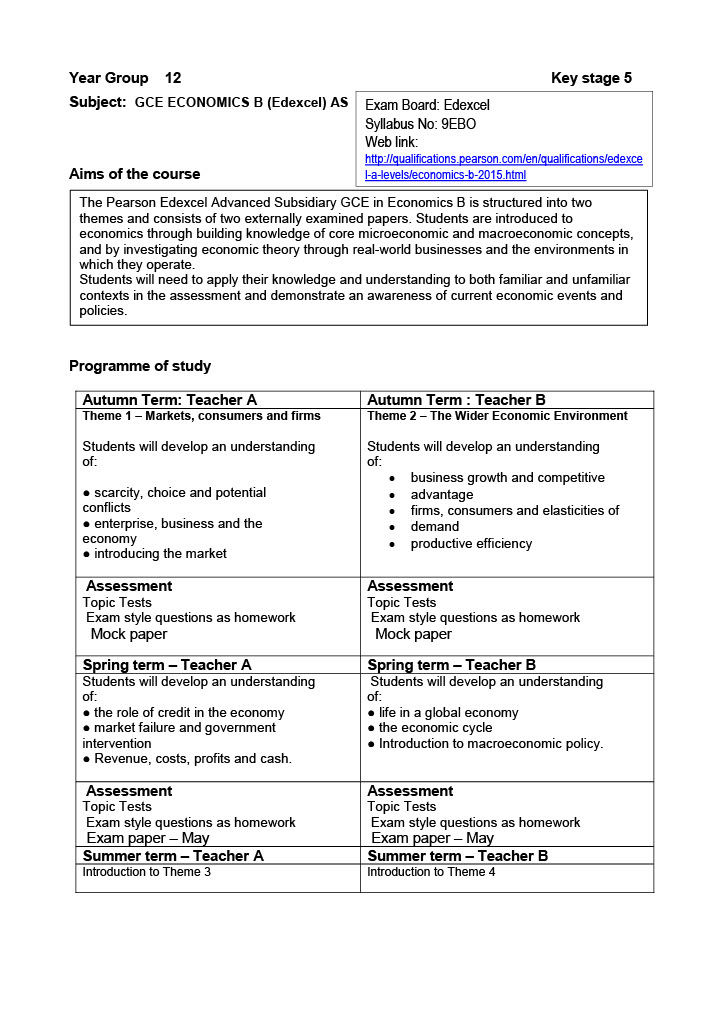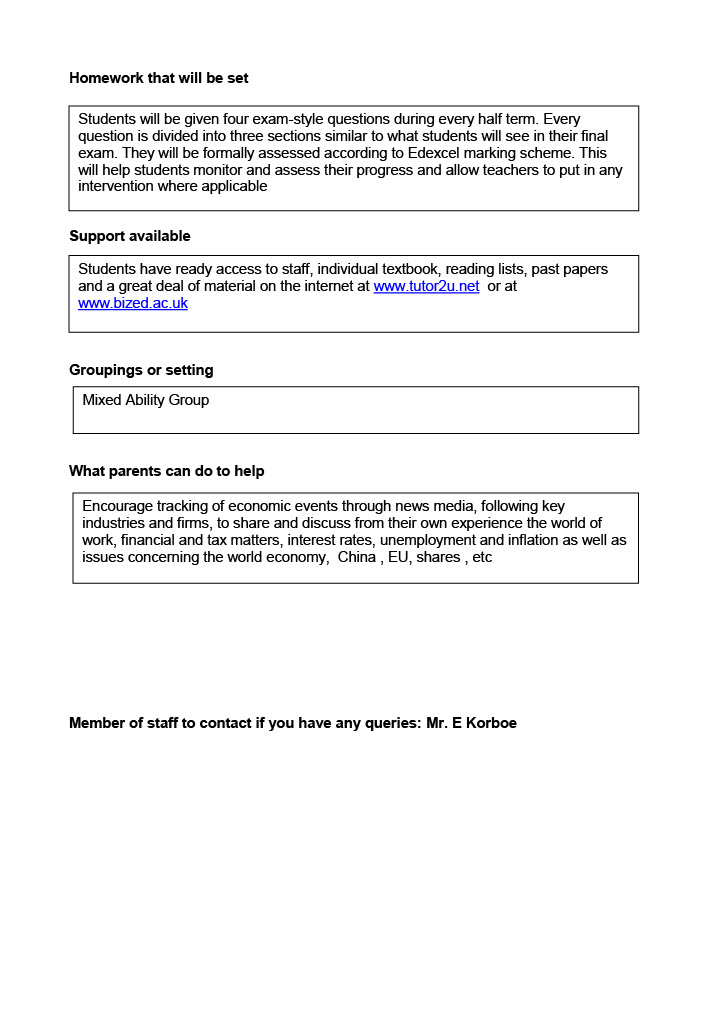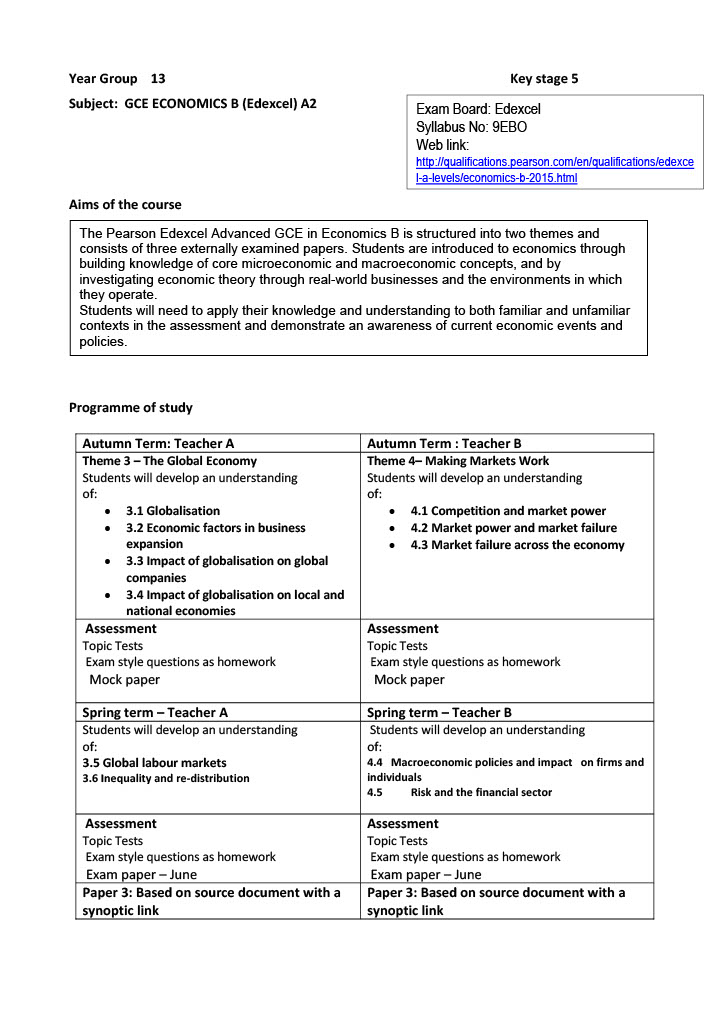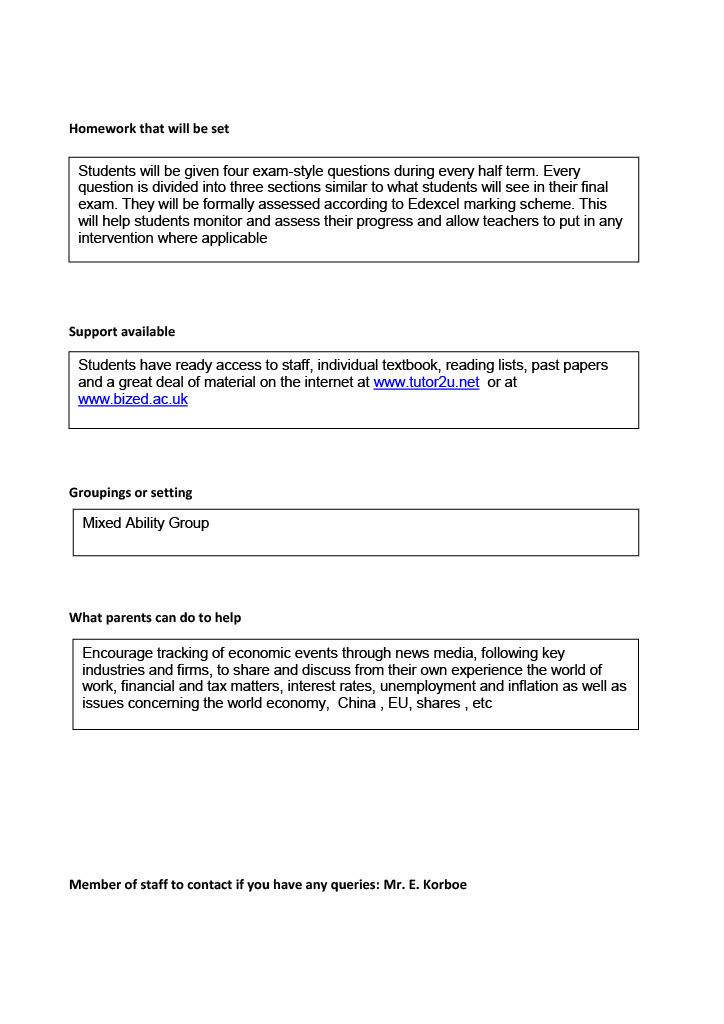Key Objectives
Art - Key Objectives
Careers in the Curriculum: Click here for information.
Business Studies - Key Objectives
Child Development & Care - Key Objectives
Computer Science - Key Objectives
Careers in the Curriculum: Click here for information.
Dance - Key Objectives
Careers in the Curriculum: Click here for information.
Drama - Key Objectives
Careers in the Curriculum: Click here for information.
Economics - Key Objectives
Engineering & Product Design - Key Objectives
Careers in the Curriculum: Click here for information.
English - Key Objectives
Food Preparation & Nutrition - Key Objectives
Geography - Key Objectives
Careers in the Curriculum: Click here for information.
Government and Politics - Key Objectives
Learning plan:
|
|
Year 12 |
Year 13 |
|
|
Autumn 1 |
UK Politics (Paper 1)
|
UK Government (Paper 2)
|
UK Politics (Paper 1)
UK Government (Paper 3)
|
|
Autumn 2 |
UK Politics (Paper 1)
|
UK Government (Paper 2)
|
Government and politics of the USA (Paper 3)
|
|
Spring 1 |
UK Politics (Paper 1)
|
UK Government (Paper 2)
|
Government and politics of the USA (Paper 3)
|
|
Spring 2 |
UK Politics (Paper 1)
|
UK Government (Paper 2)
|
Government and politics of the USA (Paper 3)
|
|
Summer 1 |
UK Politics (Paper 1)
|
Revision and exam preparation |
|
|
Summer 2 |
Revision and PPE preparation |
Exams |
|
Departmental Global Aims:
- For students to understand their culture, heritage and how they fit into modern day society.
- To address the mistakes of the past and educate students on how to prevent them in the future.
- To analyse and debate the systems in place in the UK and consider alternatives (including comparisons with other countries).
Departmental Philosophy & Vision:
It is our aim to ensure that our students get the opportunity to investigate government and politics through a diverse and varied curriculum.
Our vision is to develop key skills including:
- Scrutiny of interpretations and comparison of arguments within an interpretation.
- The ability to recognise causes, consequences and significance with reference to specific events/scenarios/situations.
- Awareness of political ideologies, the extent of agreement between political theorists and application of ideas to specific scenarios.
- Comparison of key elements of government and politics with the structures in place in another country.
This enables our students to fulfil the requirements of the specification by creating:
- Comparative analyses of interpretations
- Evaluation of viewpoints and opinions
- Analysis of the extent of agreement within a political ideology
- Comparative evaluation of the extent of similarity between UK government and politics and that of the USA
Extra-Curricular & Enrichment Activities
Extra-Curricular: Students have the opportunity to participate in (and lead) our Debate Club.
Enrichment: Students are invited to attend an educational visit to the Houses of Parliament
Support & Guidance
Homework:
This is divided into directed and guided independent study.
Directed independent study
- Homework – exam questions set by teachers
- Revision for assessments
- Independent tasks – these are short activities at the end of the PowerPoint for each lesson that we expect students to complete after the lesson.
Guided independent study
- Extra research – there are links at the end of the PowerPoints for each lesson to websites/articles/videos that would be useful to students
- Key debates/issues grids – these cover the key debates covered in each unit and students should be annotating them with evidence and analysis for each debate
- Extra exam questions and rewrites of marked exam questions
Reading: Students should be focused on current affairs and keeping a diary/log of what they read/see. Specific examples that are relevant to the specification are to be noted down to be used as evidence for debates/analyses.
History - Key Objectives
Careers in the Curriculum: Click here for information.
Mathematics - Key Objectives
Careers in the Curriculum: Click here for information.
Media Studies - Key Objectives
Modern Foreign Languages (French & Spanish) - Key Objectives
Music - Key Objectives
Departmental Global Aims:
• Promote enjoyment in music through self-expression, participation and performance in both singing and instrumental activities
• Develop an analytical, creative, and intuitive understanding of the musical elements and appreciation of a wide variety of musical forms
• Promote confidence and skills mastery on a number of different platforms in both composition and performance
• Broaden musical interests and experiences, using their imagination to develop their creativity
• To fully prepare students for the transition between KS3 to GCSE / BTEC Music
Departmental Philosophy & Vision:
Music has been at the heart of human existence and is intrinsic to all our lives. It provides us with entertainment and a means of escape. It is a reliever of stress and a language of both personal and collective expression.
As composers, performers, and listeners we discover the place of music in history, culture and time so we can appreciate the significant impact of music in all our lives. Music surrounds us, embodies us and encapsulates our soul. It helps spark imagination or ignite a lifetime of passion. Music stimulates, challenges, and enriches all our lives.
Extra-Curricular & Enrichment Activities:
Within the department, the choir, and band clubs after school along with use of practice rooms will be offered to all students.
In addition, students can sign up for 1-1 tuition (via parent pay)
Students will have access to backing tracks via School Gateway and SHMW. Free vocal warm up links will be on Gateway from You Tube. Studying similar characters in other Musicals and drawing comparisons.
Support & Guidance:
Homework: Regular homework to consolidate learning or to prepare for lessons.
Active participation in chosen instrument/voice lessons outside of school.
Check the quality of work produced – completed in their own words?
Reading: Provision of Reading Materials: newspaper articles, magazine articles – discussions around music, soundtracks to films, musical theatre.
More resources will be added throughout the term
Year 7
|
Week |
Topic |
PC deadline |
Assessment |
|
1 |
Introduction to Music – why we warm up? |
|
|
|
2 |
Different types of musical theatre |
|
|
|
3 |
Hakuna Matata characters & video |
|
|
|
4 |
Role on the Wall |
|
Assessment criteria |
|
5 |
Assessment prep |
|
|
|
6 |
Assessment prep / Assessment |
|
Year 7 assessment week |
|
7 |
Assessment |
|
Hakuna Matata |
|
October half term |
|||
|
8 |
Closing the loop |
PC1a closes |
|
|
9 |
Notation & Rhythm – music theory |
|
|
|
10 |
Notation & Rhythm – treble clef |
|
|
|
11 |
Recorder booklets and recorders given out |
|
|
|
12 |
Recorder booklet – xmas carols |
|
|
|
13 |
Recorder booklet – xmas carols |
|
|
|
14 |
Recorder booklet |
|
Assessment criteria |
|
Christmas |
|||
|
15 |
Recorder booklet |
|
|
|
16 |
Assessment prep/assessment |
|
Year 7 assessment week |
|
17 |
Assessment |
|
Recorder Stretch & Challenge |
|
18 |
Closing the loop/feedback |
PC2a closes |
|
|
19 |
Recorder booklet |
|
|
|
20 |
Recorder booklet |
|
|
|
February half term |
|||
|
21 |
Instruments of the orchestra |
|
Room swap M2 |
|
22 |
Keyboard skills |
|
|
|
23 |
Instruments of the orchestra |
|
Room swap M2 |
|
24 |
Keyboard skills |
|
|
|
25 |
Instruments of the orchestra |
|
Room swap M2 |
|
26 |
Keyboard skills |
|
|
|
Easter |
|||
|
27 |
Intro to cubase |
|
Room swap to M2 |
|
28 |
Protest song |
|
|
|
29 |
Intro to cubase |
|
Room swap to M2 |
|
30 |
Protest song |
|
|
|
31 |
Intro to cubase |
|
|
|
32 |
Protest song – intro to project |
|
|
|
May half term |
|||
|
33 |
Project |
|
Year 7 EoY test |
|
34 |
Project |
|
Year 7 EoY test |
|
35 |
Project performance |
|
Project assessments |
|
36 |
Project performance |
|
|
|
37 |
Musical Elements |
PC3b closes |
|
|
38 |
Musical Elements |
|
|
|
39 |
Musical Elements |
|
|
Year 8
|
Week |
Topic |
PC deadline |
Assessment |
|
1 |
Music Theory |
|
|
|
2 |
Music for Film |
|
|
|
3 |
Music for Film |
|
|
|
4 |
Music for Film |
|
|
|
5 |
Music for Film |
|
|
|
6 |
Music Theory in prep for assessment |
|
|
|
7 |
Music Theory in prep for assessment |
|
Assessment criteria |
|
October half term |
|||
|
8 |
Assessment |
|
Create a Leitmotif |
|
9 |
Assessment |
|
Create a Letmotif |
|
10 |
Feedback for assessment |
PC1a closes |
|
|
11 |
Introduction to Cubase |
|
|
|
12 |
Cubase |
|
|
|
13 |
Cubase project |
|
|
|
14 |
Cubase project |
|
|
|
Christmas |
|||
|
15 |
12 Bar Blues |
|
|
|
16 |
12 Bar Blues |
|
|
|
17 |
12 Bar Blues |
|
|
|
18 |
12 Bar Blues |
|
Assessment on 12 bar blues |
|
19 |
12 Bar Blues |
|
Assessment on 12 bar blues |
|
20 |
12 bar blues |
PC2a closes |
|
|
February half term |
|||
|
21 |
Ukulele |
|
|
|
22 |
Ukelele |
|
|
|
23 |
Ukelele |
|
|
|
24 |
Ukelele |
|
|
|
25 |
Ukelele |
|
|
|
26 |
Ukelele |
|
|
|
Easter |
|||
|
27 |
Keyboard Skills |
|
Room swap to M2 |
|
28 |
Introduction to Chords (review 12 bar blues) |
|
|
|
29 |
Keyboard Skills |
|
Room swap to M2 |
|
30 |
Recap film music |
|
|
|
31 |
Understanding Underscore |
|
|
|
32 |
Introduction to Project |
|
|
|
May half term |
|||
|
33 |
Project |
|
Year 8 EoY test |
|
34 |
Project – Teams quiz on film music |
|
Year 8 EoY test |
|
35 |
Project |
|
Project assessments |
|
36 |
Assessment Week |
|
Project assessments |
|
37 |
Assessment Week |
PC3b closes |
|
|
38 |
Musical Elements |
|
|
|
39 |
Musical Elements |
|
|
Year 9
|
Year 9 – Phase 1
|
Silver Arts Pantomime |
|
Year 9 – Phase 2 – Music theory/musical elements
Mastery Descriptors I can read the notes of treble clef I can describe musical elements in music I can read the notes of bass clef I can name instruments from each orchestral family
|
Music Theory Focus on Sound – Music Theory & Music for Film Week 1 – Recap on music theory Week 2 – Music for Film Week 3 – Instruments Week 4 – Voice – assessment via Focus on Sound Week 5 – Cubase Week 6 – Project work – Music industry Week 7 – Music Industry Week 8 – Music Industry Week 9-11 – Presentation of roles in the music industry |
|
Year 9 – Phase 3 – Project Work |
Composition & Performance
Form a Band and perform 3 cover songs Create 3 dance tracks for an EP Write a song using either Cubase or chosen instruments
Assessment will be a practical one
|
Year 10/11
|
Week |
Lesson1 |
Lesson 2 |
Intervention |
PC deadline |
Assessment |
||
|
1 |
Composition Refresh |
Composition Refresh |
Composition |
|
|
||
|
2 |
Africa |
Free Comp |
Free Composition |
|
|
||
|
3 |
Africa |
Badinerie |
Comp |
|
|
||
|
4 |
Focus on Sound |
Focus on Sound |
Free Comp |
|
|
||
|
5 |
Focus on Sound |
Focus on Sound |
Free Comp |
|
|
||
|
6 |
Focus on Sound |
8 marker question |
|
|
|
||
|
7 |
Focus on Sound |
Set Works |
Set Brief title given out |
|
|
||
|
|
|
October half term |
|||||
|
8 |
Musical Elements |
Exam prep |
Free comp |
|
|
||
|
9 |
Africa |
Badinerie |
Free comp |
|
|
||
|
10 |
Focus on Sound |
Focus on Sound |
Free Comp |
|
|
||
|
11 |
Study Leave |
Study Leave |
Study Leave |
|
PPE – Appraising Paper |
||
|
12 |
Study Leave |
Study Leave |
Study Leave |
|
|
||
|
13 |
Component 1 & 2 |
Component 1 & 2 |
Component 1 & 2 |
Pc1 closes |
|
||
|
14 |
Component 1 & 2 |
Component 1 & 2 |
Finish early |
|
Dates set for Recording |
||
|
|
|
Christmas |
|||||
|
15 |
Free Compositions Paperwork and piece prep |
Free Compositions prep |
Free Compositions prep |
|
|
||
|
16 |
Free composition paperwork & recording uploaded |
Free composition paperwork & recording uploaded |
Free composition paperwork & recording uploaded |
|
Moderation of Comp 2 (free comp) |
||
|
17 |
Ensemble / solo Prep |
Ensemble / solo Prep |
Ensemble / solo Prep |
|
|
||
|
18 |
Ensemble / Solo Prep |
Ensemble / Solo Prep |
Ensemble solo prep |
|
Challenge moderation |
||
|
19 |
Recording Week |
Recording Week |
Recording Week |
|
Moderation of Comp 1 |
||
|
20 |
Love Lounge |
Set brief prep |
Set brief Prep |
|
|
||
|
|
|
February half term |
|||||
|
21 |
Set brief prep |
Set brief prep |
Set brief prep |
|
Challenge moderation |
||
|
22 |
Set brief Recording |
Set brief recording |
Set brief recording |
|
|
||
|
23 |
Recording Week |
Recording Week |
Recording Week |
|
|
||
|
24 |
Clean up Week for absences |
Clean up Week for absences |
Clean up Week for absences |
|
Moderation of Component 2 (set brief) |
||
|
25 |
Prep for Component 3 |
Prep for Component 3 |
Prep for Component 3 |
|
|
||
|
26 |
|
|
|
|
Challenge moderation |
||
|
|
|
Easter |
|||||
|
27 |
Prep for Component 3 |
Prep for Component 3 |
Prep for Component 3 |
|
|
||
|
28 |
Prep for Component 3 |
Prep for Component 3 |
Prep for Component 3 |
|
|
||
|
29 |
Prep for Component 3 |
Prep for Component 3 |
Prep for Component 3 |
|
|
||
|
30 |
Prep for Component 3 |
Prep for Component 3 |
Prep for Component 3 |
|
|
||
|
31 |
Prep for Component 3 |
Prep for Component 3 |
Prep for Component 3 |
|
|
||
|
32 |
Prep for Component 3 |
Prep for Component 3 |
Prep for Component 3 |
|
|
||
|
|
|
May half term |
|||||
Careers in the Curriculum: Click here for information.
Physical Education - Key Objectives
Religion, Philosophy & Ethics - Key Objectives
Careers in the Curriculum: Click here for information.
Science - Key Objectives
Social Sciences: Psychology & Sociology - Key Objectives
Textiles - Key Objectives
Hard copies of any of the documents listed can be obtained from the school Reception or requested via our admin email address on admin@westhatch.net




